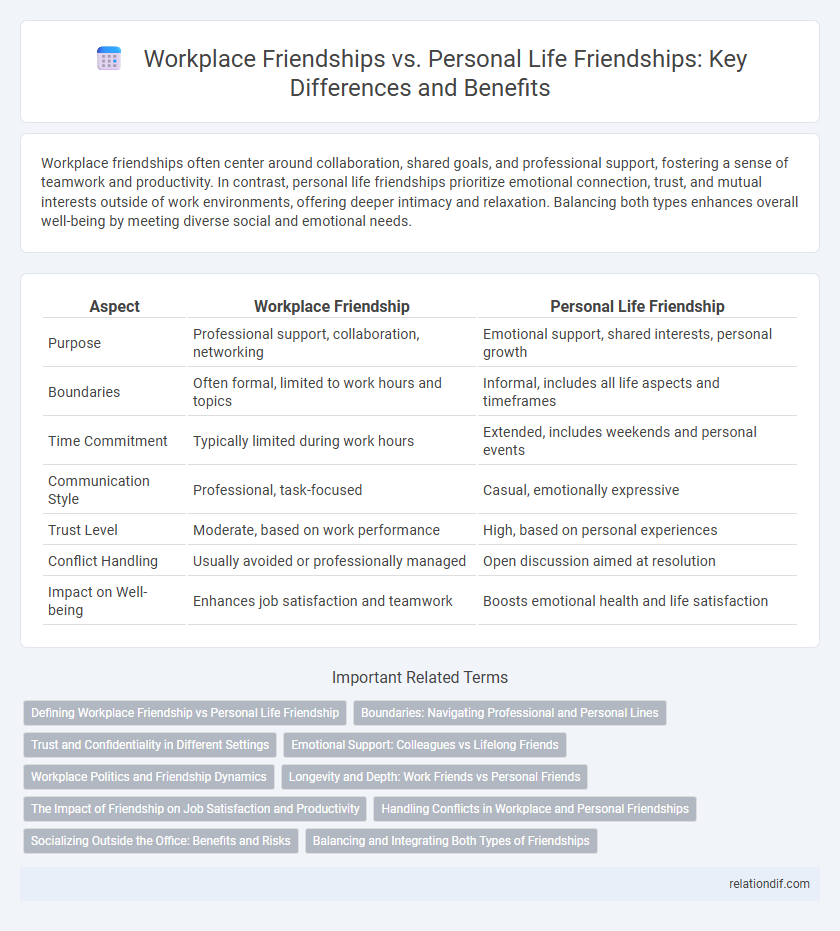Workplace friendships often center around collaboration, shared goals, and professional support, fostering a sense of teamwork and productivity. In contrast, personal life friendships prioritize emotional connection, trust, and mutual interests outside of work environments, offering deeper intimacy and relaxation. Balancing both types enhances overall well-being by meeting diverse social and emotional needs.
Table of Comparison
| Aspect | Workplace Friendship | Personal Life Friendship |
|---|---|---|
| Purpose | Professional support, collaboration, networking | Emotional support, shared interests, personal growth |
| Boundaries | Often formal, limited to work hours and topics | Informal, includes all life aspects and timeframes |
| Time Commitment | Typically limited during work hours | Extended, includes weekends and personal events |
| Communication Style | Professional, task-focused | Casual, emotionally expressive |
| Trust Level | Moderate, based on work performance | High, based on personal experiences |
| Conflict Handling | Usually avoided or professionally managed | Open discussion aimed at resolution |
| Impact on Well-being | Enhances job satisfaction and teamwork | Boosts emotional health and life satisfaction |
Defining Workplace Friendship vs Personal Life Friendship
Workplace friendship centers on professional collaboration and mutual support within organizational roles, often shaped by shared tasks, goals, and work-related interactions. Personal life friendship is characterized by emotional intimacy, trust, and social bonding beyond professional boundaries, fostering deeper connections based on common interests and life experiences. Distinct boundaries and expectations differentiate workplace friendships from personal life friendships, influencing communication styles and relational dynamics.
Boundaries: Navigating Professional and Personal Lines
Workplace friendships require clear boundaries to maintain professionalism, ensuring that personal issues do not interfere with job responsibilities. Setting limits on sharing sensitive information and socializing during work hours helps preserve respect and trust among colleagues. Balancing these boundaries allows individuals to enjoy supportive connections without compromising career goals or personal well-being.
Trust and Confidentiality in Different Settings
Workplace friendships rely heavily on maintaining trust while balancing professional boundaries, where confidentiality often centers on work-related information and mutual respect for company policies. In personal life friendships, trust deepens through emotional vulnerability and sharing private matters without fear of judgment or breach of confidence. Understanding these distinct dynamics ensures that trust and confidentiality are preserved appropriately in both contexts, fostering healthy and supportive relationships.
Emotional Support: Colleagues vs Lifelong Friends
Workplace friendships provide emotional support through shared professional challenges and everyday interactions that foster understanding within job-related contexts. Lifelong friends offer deeper emotional support rooted in long-term trust, personal history, and unconditional acceptance beyond work environments. The intensity and nature of emotional support differ, with colleagues addressing situational stressors and lifelong friends providing enduring comfort during life's significant moments.
Workplace Politics and Friendship Dynamics
Workplace friendships often navigate complex dynamics influenced by organizational hierarchies and office politics, requiring careful balance to maintain professionalism while fostering trust. These relationships can enhance collaboration and employee satisfaction but risk entanglement in workplace conflicts or favoritism perceptions. In contrast, personal life friendships typically involve deeper emotional connections and fewer external pressures, allowing more genuine support and vulnerability.
Longevity and Depth: Work Friends vs Personal Friends
Workplace friendships often center on shared projects and professional goals, leading to more situational and task-oriented bonds that may wane after job changes or role shifts. Personal life friendships tend to develop through shared experiences over time, fostering deeper emotional connections and greater longevity beyond specific environments. The depth and resilience of personal friendships often surpass those of work friends due to sustained mutual support and intimate understanding.
The Impact of Friendship on Job Satisfaction and Productivity
Workplace friendships significantly enhance job satisfaction by fostering trust, collaboration, and emotional support among colleagues, which directly boosts productivity and engagement. Personal life friendships provide emotional stability that employees carry into the workplace, reducing stress and improving focus during work tasks. Both types of friendships contribute to a positive work environment, leading to higher retention rates and overall organizational success.
Handling Conflicts in Workplace and Personal Friendships
Workplace friendships require navigating conflicts with professionalism and clear communication to maintain productivity and a positive environment. Personal life friendships often allow for more emotional expression and forgiveness during disagreements, promoting deeper understanding and long-term resilience. Balancing these approaches ensures effective conflict resolution in both spheres, fostering trust and collaboration.
Socializing Outside the Office: Benefits and Risks
Socializing outside the office strengthens workplace friendships by fostering trust, improving communication, and boosting team collaboration, which enhances overall productivity. However, it poses risks such as blurred boundaries, potential conflicts of interest, and challenges in maintaining professionalism. Balancing these social interactions requires clear boundaries to maximize benefits while minimizing risks to personal and professional relationships.
Balancing and Integrating Both Types of Friendships
Balancing workplace friendship and personal life friendship requires clear boundaries to maintain professionalism while nurturing genuine connections. Integrating both types involves allocating time for social interactions outside work without compromising career responsibilities. Prioritizing trust, communication, and respect across settings enhances emotional support and collaboration in both spheres.
Workplace friendship vs Personal life friendship Infographic

 relationdif.com
relationdif.com